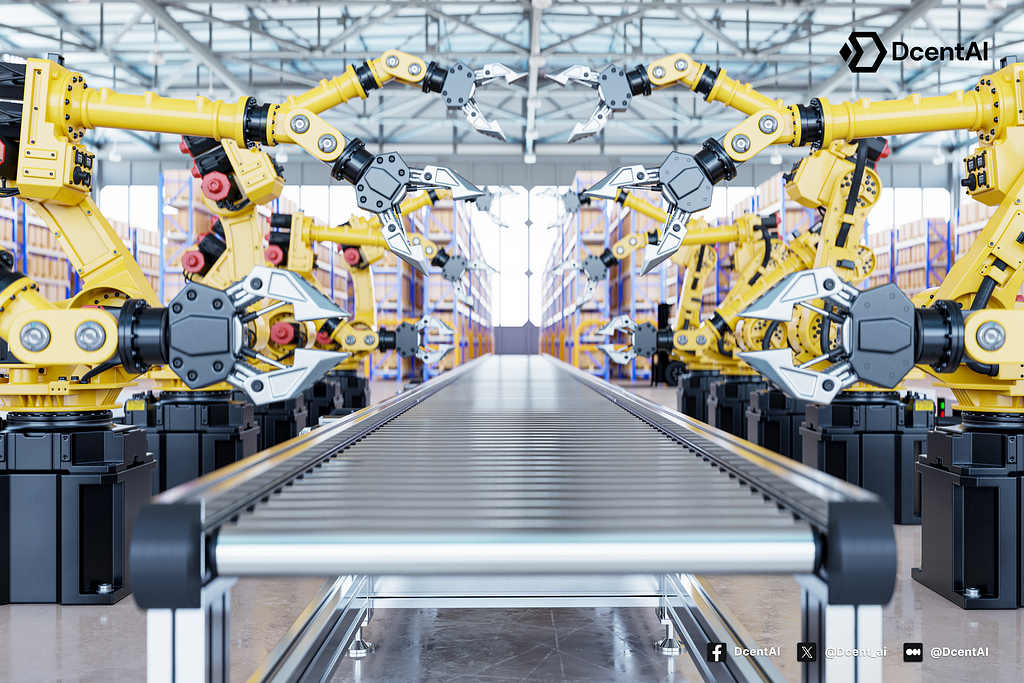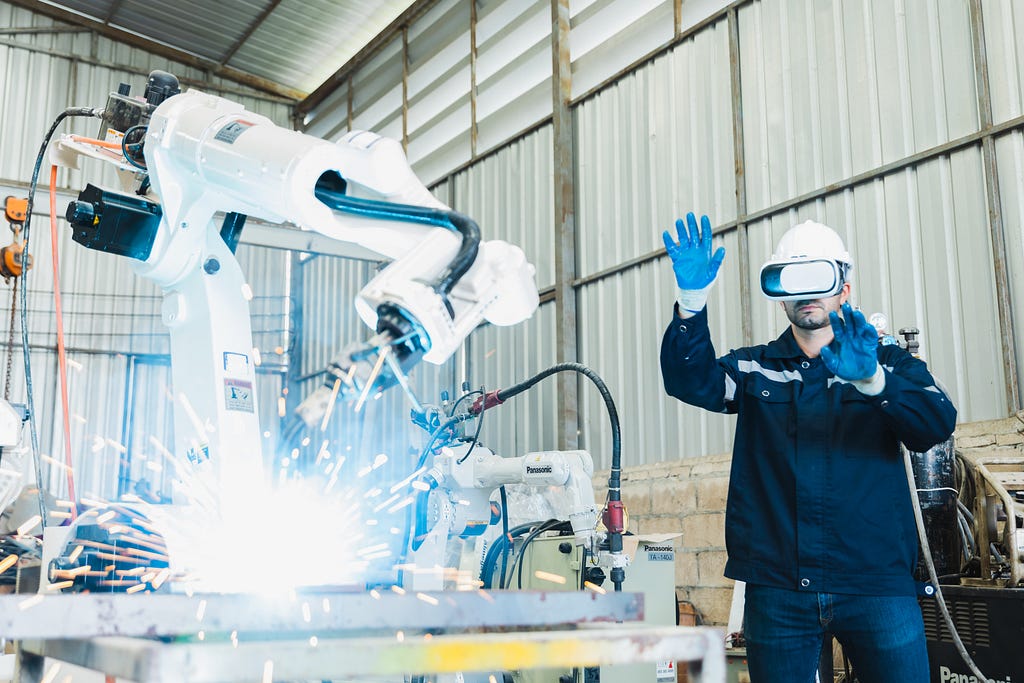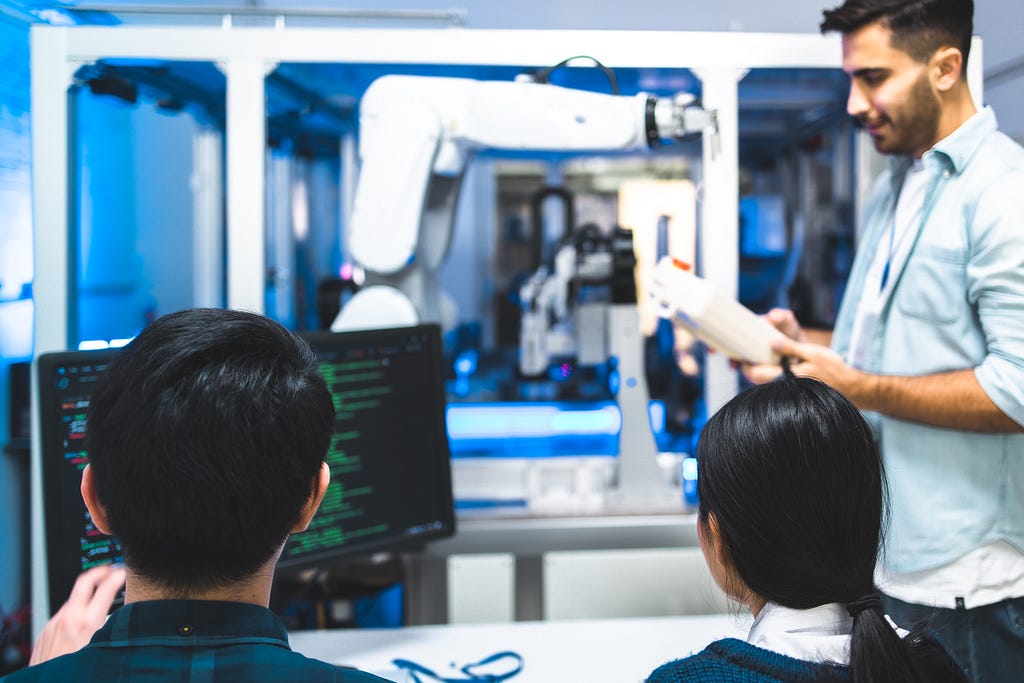How Much Does It Cost to Build a Generative AI in 2025?

Manufacturing firms are quickly changing due to technological advancements and an increasing desire for efficiency and creativity. AI enhances traditional industrial processes by optimizing production lines, controlling supply networks, and increasing efficiency. Decentralized artificial intelligence revolutionizes increasingly complicated and data-centric industrial processes.
Unlike conventional AI, decentralized AI spreads data processing among various nodes, which enhances security, scalability, and overall execution. This article will look at how decentralized AI is altering the manufacturing field.Networks like DcentAI drive this transformation, providing solutions that help firms optimize operations, lower costs, and remain competitive in a changing market.
Become a pioneer of DcentAI community!Benefits of Decentralized AI in ManufacturingDecentralized AI provides various benefits to the manufacturing business, including helping to optimize processes and improve overall efficiency:
Increased operational efficiency.Decentralized AI empowers real-time data processing over various production plants, permitting consistent communication and decision-making. This real-time coordination empowers faster responses to production concerns, improved workflows, and reduced downtime, resulting in increased operational effectiveness.
Enhanced SecurityTraditional centralized systems are susceptible to extensive cyber-attacks, as a single compromise can threaten the integrity of the entire network. In contrast, decentralized AI transmits data across multiple nodes, reducing the liability of a single point of failure and enhancing overall cybersecurity, thereby rendering the framework more flexible against attacks.
Scalability and FlexibilityAs manufacturing demands increase, decentralized AI easily scales by adding more nodes to the network. This flexible system allows manufacturers to expand production without overhauling existing infrastructure, ensuring the network grows with production needs.
Improved Predictive MaintenanceDecentralized AI permits autonomous systems to trade real-time knowledge, empowering predictive maintenance to avoid hardware breakdowns. Decentralized AI frameworks can determine when maintenance is required by continually monitoring machinery and assessing data from various sources, performing in less precious downtime and longer equipment life.
Supply Chain OptimizationDecentralized AI improves supply chain management by coordinating resource allocation and logistics in real-time over decentralized systems. It leads to advanced asset allocation, lower delays, and more precise demand estimates, performing in a more effective and responsive supply chain. Networks like DcentAI are crucial in enabling these advancements helping manufacturers achieve operational success.
Challenges in Implementing Decentralized AI in Manufacturing
Implementing decentralized AI in manufacturing comes with several challenges, but platforms like DcentAI offer solutions to overcome them:
Complexity of Integration with Legacy SystemsOne of the key obstacles is integrating decentralized AI into the current manufacturing infrastructure, which is regularly based on centralized frameworks. This move can be complicated and resource-intensive, requiring a total redo of data administration frameworks and operational workflows.
DcentAI offers adaptable solutions that integrate with legacy systems, minimizing disruption during the transition. Its flexible architecture allows decentralized AI to coexist with traditional models, enabling gradual implementation without a complete system overhaul. Additionally, DcentAI provides automated data migration and reconfiguration tools, ensuring a smooth transition.
Data Synchronization and ConsistencyData in decentralized networks is distributed over various nodes, which might cause data synchronization concerns. Maintaining consistent, up-to-date data in all areas supports correct decision-making and eliminates operational disruptions.
DcentAI utilizes advanced synchronization techniques and real-time algorithms to ensure consistent data flow across all nodes. It monitors data exchange and adjusts in real-time, preventing data lag, redundancy, or loss. It guarantees accurate and consistent information across the network, which is vital for managing decentralized manufacturing processes.
Scalability and Resource ManagementAs manufacturing scales, managing an increasingly extensive network of nodes becomes complex. Ensuring consistent performance, even as the network grows, is crucial for maintaining operational efficiency.
DcentAI’s decentralized architecture inherently supports scalability. As production demands increase, the platform can easily add new nodes to the network without causing bottlenecks. It optimizes resource allocation and balances workloads across nodes to maintain smooth operations as the manufacturing environment scales.
Cybersecurity ConcernsDecentralizing data storage and processing might raise security concerns. Each node must be separately ensured to prevent illegal access and safeguard vital operational data.
DcentAI improves security through solid encryption and access control methods throughout its decentralized network. Each node is fortified with complex security protocols, making it more difficult for aggressors to compromise the network. DcentAI also continually checks for threats in real-time, providing early identification and rapid response to possible risks.
Governance and Decision-MakingIn decentralized systems, decision-making becomes distributed, leading to difficulties coordinating actions and ensuring that all stakeholders follow consistent policies, especially regarding data management and operational protocols.
DcentAI provides a transparent governance framework that enables stakeholders to participate in decision-making while maintaining network-wide coordination. The platform offers tools for distributed governance, ensuring that data management, security, and operational policies are applied uniformly across all nodes, promoting consistency and operational efficiency.
By addressing these challenges, DcentAI enables manufacturers to leverage the full potential of decentralized AI, transforming operations, enhancing efficiency, and improving scalability securely and reliably.
Real-World Examples of Decentralized AI in Manufacturing
Here are some of the real-world applications of decentralized AI in manufacturing:
Siemens’ Decentralized Manufacturing SystemsSiemens has integrated decentralized AI into its Digital Enterprise platform, where smart factories utilize AI-powered processes to automate decision-making and maximize yield. Siemens can respond rapidly to shifting needs while holding operational efficiency by decentralizing data across various manufacturing plants. Decentralized AI in these systems permits real-time monitoring and predictive maintenance, significantly lowering downtime and operating costs.
Bosch’s Industry 4.0 TransformationBosch is an essential participant in decentralized AI for manufacturing, particularly as it moves toward Industry 4.0. To run autonomous manufacturing lines, the trade uses decentralized AI, which permits machines to connect directly without employing a central server. This decentralized communication empowers speedier decision-making, real-time optimization of industrial processes, and greater flexibility in meeting consumer expectations. Bosch’s decentralized AI network also progresses security by distributing critical operational data over distinctive nodes, lowering the danger of cyber-attack.
General Electric’s (GE) AI-Driven Predictive MaintenanceGE used decentralized AI in its era districts to boost the predictive support of its machines. By spreading information over various hubs, GE AI frameworks can survey gear execution data in real-time, recognizing conceivable flaws sometime recently. This decentralized demonstration minimizes reliance on centralized data centers while expanding versatility over its around-the-world operations, resulting in cheaper support costs and higher gear uptime.
Haier’s Smart Factory EcosystemHaier, a global leader in home appliances, utilizes decentralized AI to power its Internet of Clothing smart factories. These factories are driven by decentralized AI systems that connect machines, data, and customer orders, allowing for mass customization of products. The decentralized nature of Haier’s AI ecosystem will enable it to respond to customer orders in real-time, adjusting production processes dynamically to meet specific requirements. This results in more efficient supply chain management and improved customer satisfaction.
Foxconn’s Decentralized AI for Supply Chain OptimizationFoxconn, the world’s largest electronics company, has embraced decentralized AI to progress its supply chain. Foxconn can better organize its assets by leveraging decentralized systems to oversee and distribute real-time data over several manufacturing units. This decentralized approach empowers Foxconn to dynamically assign assets and change production schedules depending on real-time demand, eliminating delays and increasing overall supply chain efficiency.
The Future of Decentralized AI in ManufacturingThe future of decentralized AI in manufacturing offers enormous efficiency, scalability, and sustainability improvements. Decentralized AI will empower completely autonomous systems in which equipment and systems communicate in real-time to optimize operations and diminish downtime. Edge AI will empower speedier decision-making on the production floor, while collaborative networks will make stronger connections between suppliers and manufacturers.
Decentralized AI will also progress human-machine collaboration, empower sustainable practices, and permit more personalization in production. Supply chains will become more robust, adaptable, and transparent, enabling businesses to run efficiently despite external disturbances. With frameworks like DcentAI leading the way, decentralized AI will drive more competent, efficient, and sustainable manufacturing processes, permitting businesses to survive in an increasingly competitive global marketplace.
In ConclusionDecentralized AI is poised to transform manufacturing by enhancing functional efficiency, refining security, and allowing real-time decision-making across decentralized networks. It provides adaptable and versatile solutions for increasing production needs while enhancing predictive maintenance and streamlining supply chains.
Despite implementation obstacles, networks like DcentAI are bridging the gap by delivering modern tools that make integration easier while guaranteeing secure, efficient, and decentralized frameworks.As decentralized AI evolves, it’ll transform the manufacturing scene, fostering innovation, increasing efficiency, and opening the road for smarter, more sustainable industrial processes.
Become a pioneer of DcentAI community!To learn more about DcentAI, visit our Facebook and X accounts.Revolutionizing Manufacturing through Decentralized AI was originally published in Coinmonks on Medium, where people are continuing the conversation by highlighting and responding to this story.
